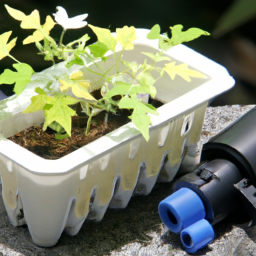Electroculture Gardening How To
Electroculture Gardening How To
Electroculture Gardening: How to Make the Most of it
Electroculture gardening is an innovative technique to maximize the growth and health of plants without relying on external fertilizer or manual labor. It uses electric charges transmitted through a series of interconnected electrodes in the soil and the roots of the plants to stimulate growth and yield.
History of Electroculture Gardening
Electroculture gardening dates back to the 18th century when it was first used in France. Since then, it has become widely popular among gardeners all around the world due to its effective results. It was initially used to stimulate root growth, improve soil fertility, and reduce weed growth. It has since been used to enhance plant yields and viability in crop production.
The Benefits of Electroculture Gardening
Electroculture gardening offers a number of advantages over traditional gardening methods, such as improved soil fertility and enhanced plant yields. By creating a better environment for the plants, it can increase yields by up to 40%. It can also reduce soil compaction, which facilitates the absorption of moisture and minerals and increases plant abililty to grow. Additionally, it can reduce pest infestations and increase the survival rate of seeds.
An Environmentally Sustainable Alternative
Electroculture gardening is an environmentally sustainable alternative to traditional methods of gardening. By not relying on external pesticides or fertilisers to achieve better results, it reduces the amount of pollutants released into the environment and contributes to a more sustainable form of agriculture.
Reduction in Labor and Cost
In addition to being eco-friendly, electroculture gardening also requires less labor than traditional gardening methods, with no need for manual labor or additional fertilizer applications. This helps to reduce labor costs and increase productivity. It also enables gardeners to have more control over the plants and their environment, allowing them to adjust the connected electrodes to achieve the desired results.
The Potential Pitfalls
Despite its benefits, electroculture gardening does have some potential risks that should be considered. For instance, improper use of electroculture equipment can be hazardous. Additionally, electroculture can be affected by external elements, such as storms or high humidity, and can be difficult to operate in some climates. Finally, the technique is still relatively new and can be expensive to set up with the necessary electroculture equipment.
Insights
Electroculture gardening is an effective technique to maximize the growth and health of plants, reduce labor, and improve environmental sustainability. While it does come with some potential risks, these can be mitigated by following proper safety protocols and understanding the limits of this innovative technique. As more gardeners embrace the potential of electroculture gardening, they are sure to unlock a whole world of opportunities to improve their yields and reduce manual labor.

Previous Page
Next Page
